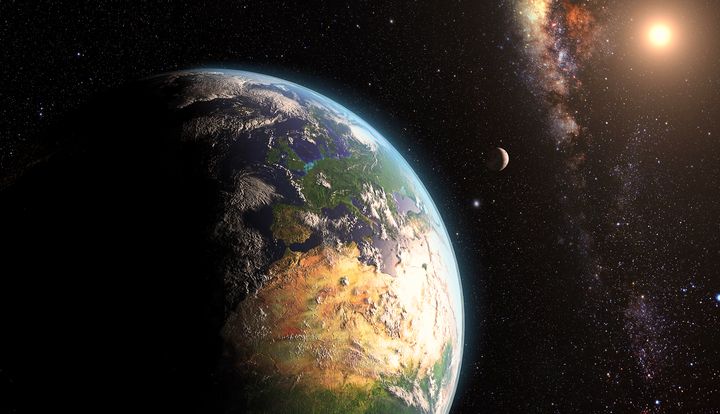
Ten years ago a group of geologists assembled to consider a startling proposition: That human impacts on the Earth are so profound they are unintentionally tipping it over a geological threshold.
The proposition was first made back in 2000 by Nobel Prize-winning atmospheric chemist, Paul Crutzen. He coined a neologism, 'the Anthropocene', because he believed that people (the Anthropos) were transforming the hydro-, cryo-, pedo-, bio- and atmosphere so much that the Holocene was ending. The Holocene is the inter-glacial epoch in which humans have flourished, starting about 11,700 years ago.
A decade after it was formed, the Anthropocene Working Group (AWG) has amassed a large body of evidence to suggest that Crutzen was correct. In fact, many members of the group believe the Anthropocene began in 1950, well within the lifetime of people like my parents. They may soon convince the global body that controls the Geological Time Scale—the International Commission on Stratigraphy—that they are right.
Geologists normally study 'deep time,' going back through Earth's 4.7 billion year history to identify key turning points. Evidence of epochal change is captured in strata: Layers of rock containing fossils and other signs of significant alterations to Earth surface processes.
What makes the AWG's ongoing work so unusual is that it's focused on the geological present. What has made its work controversial among geologists is that recent human impacts on Earth—however large they may be—are not yet captured in rock layers. Sedimentary rock takes thousands of years to form so the AWG has had to look for other evidence of epochal change.
One key marker, the Group suggests, is radioisotopes deposited after the many nuclear bomb tests during the early Cold War period. They are an enduring sign of human power to modify the global environment and can be found at all points of the compass. Other markers will only be stratigraphically significant in the long run, such as ubiquitous plastics, the mass extinction of wildlife (due to land clearing, pollution and poaching), and the bones of the billions of chickens reared and killed for their meat. Alien visitors in thousands of years will then detect a "break" occurring sometime in the 20th century.
Because the AWG is breaking new ground for geology, its members engage in healthy debate. Some are more convinced that the Anthropocene has begun than others, and some believe it may have started well before 1950.
Scientists outside the Group have also had much to say about its activities. Stan Finney, a distinguished American geologist, believes the AWG is breaking the rules of stratigraphy and should cease its work. Bill Ruddiman, an environmental scientist at the University of Virginia, believes the Anthropocene began thousands of years ago, when humans first cleared land for agriculture. This, he argues, reduced the extent of ice cover globally by increasing greenhouse gas concentrations in the atmosphere, thereby warming the planet.
Meanwhile, British geographers Mark Maslin and Simon Lewis point to the late middle ages, when Spain and Portugal colonized the New World. The effects of disease and violence on indigenous peoples significantly reduced agricultural activity in central and south America, affecting atmospheric concentrations because renewed forest growth locked up carbon dioxide and other greenhouse gases.
Why does any of this matter? What would follow if the International Commission on Stratigraphy ratified the AWG's case that the Anthropocene has arrived and began in 1950?
Clive Hamilton, a leading environmental philosopher in Australia, believes it will serve as a wake-up call. By emphasizing that humans are now as powerful as the great forces that took us in and out of the ice ages, he believes it will help us recognize the error of our ways. With the authority of science behind it, the Anthropocene label—he believes—will force us to take serious action before it's too late. Others, like Finney, demur. He argues that it is perfectly possible to call us to account for our careless treatment of the planet without formalizing a new stratigraphic moniker.
By contrast, Ruddiman, Maslin and Lewis see merit in the term but do not believe stratigraphy is the only or best way to scientifically prove that the Anthropocene has begun.
Whatever the Commission decides, the Anthropocene is a term that is here to stay. That might please those who want to see humans taking far greater care of our one and only planet. But as the American geographer Erle Ellis has pointed out, talking about the Anthropocene can easily lead to a very different response.
Having already "trashed the Earth," the term might embolden some to try to "take control" and engineer a better planet so as to produce a "good Anthropocene." Such control is the stuff of nightmares for some—could the next few centuries see reality mimic dystopian science fiction? Very possibly. The "age of humans" could well turn into the "age of human tragedy" on a hitherto unknown scale.
Noel Castree is a Professor of Geography at Manchester University, England, and an Honorary Professorial Research Fellow at the University of Wollongong, Australia. Author of the books Nature (2005) and Making Sense of Nature (2014), his research focuses on human impacts on the natural environment.
Views expressed in this article are the author's own.
Uncommon Knowledge
Newsweek is committed to challenging conventional wisdom and finding connections in the search for common ground.
Newsweek is committed to challenging conventional wisdom and finding connections in the search for common ground.
About the writer
To read how Newsweek uses AI as a newsroom tool, Click here.








